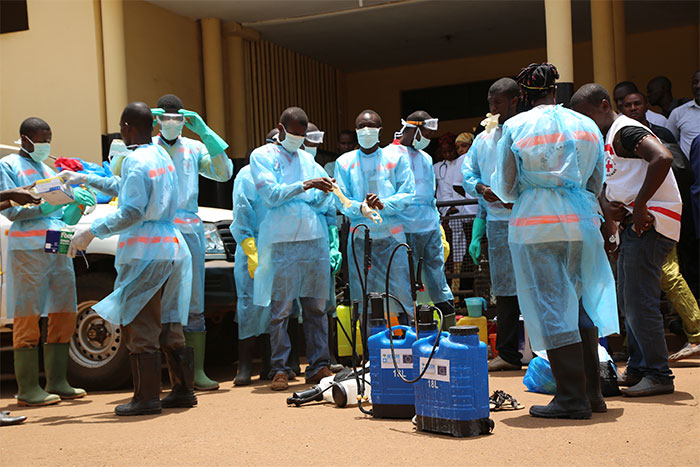Strategic thinking in the face of Ebola
Patrick Lagadec, Former Senior Research Scientist at the Ecole Polytechnique, Paris, France, and Mike Granatt, Founder and first Director of the Civil Contingencies Secretariat, Cabinet Office, UK, say that institutions and leaders must embrace strategic thinking when confronting the challenges that the Ebola outbreak is presenting.

Caption: Organisations such as the Red Cross are, in general, trusted by the population. It is vital that leaders are prepared to think rapidly and reflexively when confronting a crisis such as the spread of Ebola (photo courtesy Red Cross)
Decision-makers should stick to the facts and operational protocols… Yes, it is essential to stick to the facts, in order to avoid nightmares. Yes, it is essential to show a calm and professional outlook so as to avoid hysteria and panic. And, indeed, governments are following these guidelines.
But public anxiety will be fed if people begin to see that things appear to be a little less under control, despite repeated daily emphases not to panic, that the system is “perfectly ready” to confront Ebola and unequivocal reassurance to every question that is posed.
This is not to suggest that leaders should cry wolf, but it does mean that we should be encouraging new ways of thinking, preparing and communicating, just in case. Such an approach is more credible for today’s sceptical audiences and sets public expectations in an accurate and realistic manner. It also encourages alertness and stimulates innovative thinking.
We need to establish a Rapid Reflection Force (RRF) alongside the leaders who are dealing with the Ebola outbreak. This should be a group of highly qualified and diverse crisis handling specialists, to help decision-makers anticipate and decide from a broad perspective, looking beyond the immediate facts. They must be especially sensitive to any signal showing that conventional hypotheses, patterns, and frameworks and views could be on the wrong track, or susceptible to severe difficulties.
For example:
-
Virus: If mutation and airborne transmission become a problem;
-
Protocols: If they appear inadequate, or irrelevant.
-
Views: If one strong view or a single aberrant case appears to create a new, misleading, unspoken assumption, which silently infects the views of a whole population.
-
Critical news: Some failure of precautions or systems among some of the most reputable hospitals;
-
Critical dynamics: World Health Organization (WHO) loses credibility; Centers for Disease Control (CDC) loses credibility; European Centre for Disease Control (ECDC) loses credibility. Or worse – they all lose credibility; http://www.who.int/csr/disease/ebola/en/
-
General mood: Suspicion of conspiracies or cover-ups reach damaging levels; suspicion that leaders are urgently giving reassurance because they are scared;
-
General dynamics: Médecins sans Frontières (MSF) becomes the only trusted and respected actor;
-
Actors: Medical personnel complain of cover-up or incompetence at high levels;
-
Threat: some dangerous groups emerge to take advantage of and exploit the growing fears for their own ends.
-
In other words, it is essential to broaden the questions, and to adjust before surprises crush the answers given by the leaders and destroy their credibility, or worse: their legitimacy.
Immediate action
-
Review the organisation around the leaders: bring in broad-based analysts and thinkers to review the orthodoxies of virus experts, co-ordinators and administrators;
-
Establish some version of RFF – perhaps a virtual team - to renew, review and challenge, constantly;
-
Make sure that leaders do not hide in the bunker or become impossibly intransigent if anything strange develops;
-
Detect, analyse and act rapidly, if anticipated progress falters or fails;
-
Be prepared for the most difficult choice of all – choosing the moment when the leadership must admit that the time has come to consider new options.
Patrick Lagadec & Mike Granatt
Patrick Lagadec, 28/10/2014